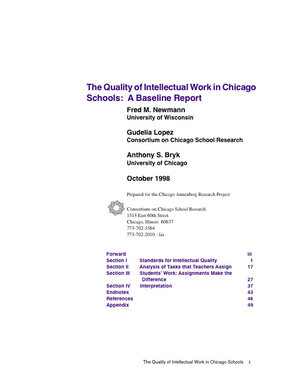This report takes a first look at the extent to which students in Chicago schools gain opportunities to succeed in more complex intellectual work.
Based on samples of assignments and student work collected from teachers, this study analyzes the intellectual demands placed on Chicago Public Schools (CPS) elementary students. Rather than relying on the results of standardized, basic skills test scores, this study sought to collect more direct evidence of the intellectual work life of students in Chicago's schools. Reseachers gathered assignments and work samples from third, sixth, and eighth graders in writing and math and rated them using criteria derived from the three components of authentic intellectual work: construction of knowledge, disciplined inquiry, and value beyond school. Their analysis focused on how often Chicago students encounter assignments that call for challenging intellectual work: construction of knowledge, disciplined inquiry, and value beyond school. Their analysis focused on how often Chicago students encounter assignments that call for challenging intellectual work rather than mere reproduction of knowledge. In addition, the study examined the connection between more demanding assignments and higher quality work. In other words, when students receive more difficult assignments, do they rise to the occasion and produce work that shows more evidence of in-depth thought?
The results show that much of the work assigned to Chicago students fails to go beyond reproduction of information, such as filling in blanks with vocabulary words or completing a set of identical math problems. Such assignments can be useful in developing a skill and knowledge base. However, if students are exposed only to such assignments, it is unlikely they will learn to succeed in the more demanding intellectual challenges posed by the modern workplace and by civic and personal affairs. The report also finds that in classrooms where teachers give more challenging assignments, student performance is considerably higher. Although giving challenging assignments does not automatically raise student achievement, it provides the necessary opportunity for students to demonstrate higher levels of performance, whereas low-quality assignments offer no such opportunity.
This report provides baseline data that will be used in future studies. It is part of the Chicago Annenberg Research Project.

